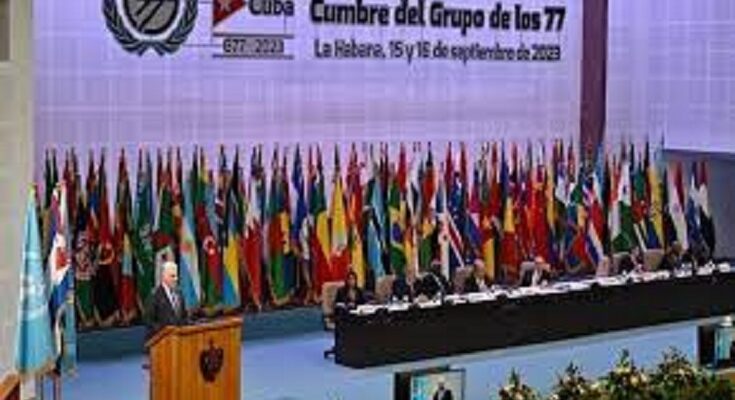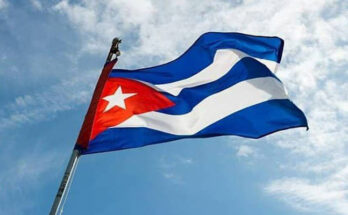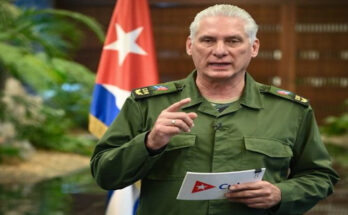The relations of Cuba with the G-77 + China is increasingly strengthening, due the the permanent role of the island in the international arena in striving for the mankind´s welfare, as the countries in the South understand the need to unite against the hegemony of the North, and for just economic order.
The summit of the G-77 held in Havana came at a time of growing frustration with the Western-led world order amid widening differences over the Russian war in Ukraine, the fight against climate change, and the global economic system.
“After all this time that the North has organized the world according to its interests, it is now up to the South to change the rules of the game,” Cuban President Miguel Diaz-Canel said at the opening of the summit.
Diaz-Canel said that developing countries were the main victims of a “multidimensional crisis” in the world today, from “abusive unequal trade” to global warming.
At the opening of the meeting he called for a world that was “more representative and responsive to the needs of developing economies”, stressing that these countries were “trapped in a tangle of global crises.”
Deeds show that a South united will surely overcome all the difficulties coming from world crisis and the imperialistic approach of the North.
United Nations chief Antonio Guterres is joining some 30 heads of state and government from Africa, Asia and Latin America at the two-day summit in Havana.
Guterres has recently attended a rash of multilateral summits, including a gathering of the G20 club of major economies in India and the BRICS group that includes Russia.
Ahead of the Havana meeting, Guterres said “this multiplicity of summits reflects the growing multipolarity of our world.”
And he warned that “multipolarity could be a factor for escalating geostrategic tensions, with tragic consequences.”
The G77 meeting comes after key changes in global blocs.
The African Union has joined the G20 group of the world’s most powerful economies, and the BRICS – Brazil, Russia, India, China and South Africa – trade group for emerging economies has expanded to admit six new members.
The presence of world leaders on its soil amounts to a recognition for the Cuban government even as the country battles its worst economic crisis in 30 years, one analyst told AFP.
“Despite the difficulties of the moment, Cuba has been recognized as a valid interlocutor,” said Cuban international relations expert Arturo Lopez-Levy, a visiting professor at the Autonomous University of Madrid.
The communist-ruled island is still under the yoke of US sanctions first imposed in 1962.
Diaz-Canel has in recent months represented the G77+China at several international meetings including a June global financial summit in Paris and an EU meeting in July with Latin American and Caribbean states.outh in 1964 “to articulate and promote their collective economic interests and enhance their joint negotiating capacity,” according to the group’s website.
Today it has 134 members, among which the website lists China although the Asian giant says it is not a full member.
Cuba took over the rotating presidency in January.
Latin American leaders such as Venezuela’s Nicolas Maduro, Colombia’s Gustavo Petro, and Argentina’s Alberto Fernandez were present at the summit, alongside Palestinian leader Mahmoud Abbas, Angola’s Joao Lourenco and Mozambican President Filipe Nyusi.
Brazilian President Luiz Inacio Lula da Silva arrived Friday night.
Fernandez said that the coronavirus pandemic marked an epochal change by “exposing the inequality” in countries’ access to vaccines, noting that “90 percent of vaccines were in the hands of 10 countries.”
Cuba played an important role world-wide in fighting Covid-19, gaining prestige in its solidarity spirit.
(With information from PL)




